With the stakes so high and national pride on the line, controversy, gamesmanship and borderline cheating is to be expected on the World Cup stage.
Even poor decisions from referees or officials are amplified to extraordinary levels given the worldwide audience watching on.
Players and countries work tirelessly during every four-year cycle hoping that all goes well when the finals come around, but controversy is almost unavoidable and can either make or crush a nation's hopes.
Here, Sports Mole looks back on the top 10 most controversial moments in World Cup history.
10. Awarding hosting rights to Qatar, 2022
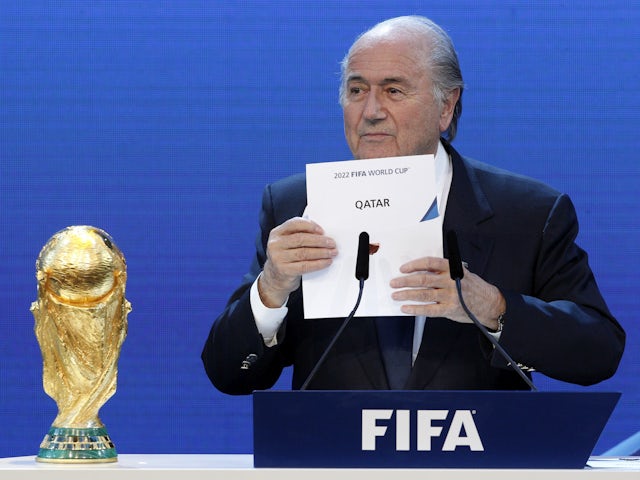 © Reuters
© Reuters
To start the list off, looking at more topical matters is an apt way to begin, as the build-up to the upcoming World Cup in Qatar has sparked conversations so far and wide that no finals has received as much scrutiny in the competition's history.
While World Cups played under fascist governments (Italy 1934), murderous regimes (Argentina 1978) and warmongers (Russia 2018) were extremely unpopular among many, the next iteration of the competition has received unprecedented levels of coverage in response to Qatar's human rights record and ethical morality.
Even Sepp Blatter, the man who opened the envelope to reveal Qatar's successful bid to host the finals, has admitted they should have never been awarded the tournament, and there are a myriad of reasons why these are set to be the most controversial finals to date.
The treatment of migrant workers who built the infrastructure for the tournament, laws against LGBT people, its attitudes towards women, and on the footballing side, the fact that it will be the first-ever winter World Cup for nations in the Northern Hemisphere due to the intense heat in Qatar, are all facets which have proved unpopular across the globe.
Many of the FIFA members who gave Qatar the green light are no longer working there, so the federation will most likely just want to get the tournament over and done with so they can close the book on what has been an extremely tumultuous build-up for them.
9. Lampard's ghost goal, 2010
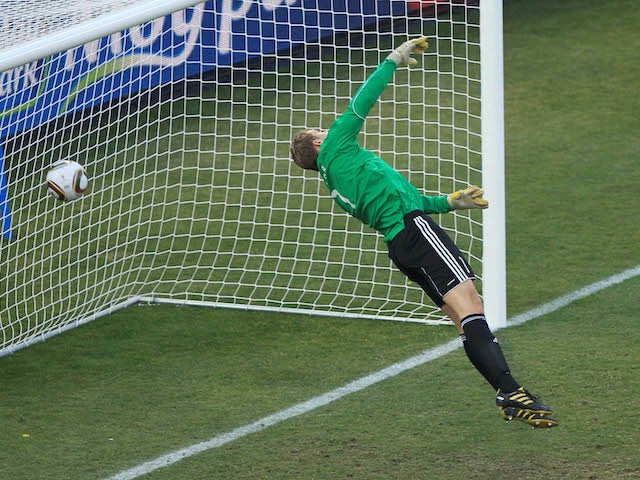 © Reuters
© Reuters
An incident which arguably led to one of football's biggest technological advances in the modern era certainly deserves a place in this list.
The idea of goalline technology had been spoken about in the years prior to the 2010 World Cup, given that similar technology was utilised in tennis, rugby and cricket, and FIFA's mind was made up in the aftermath of England's last-16 tie with Germany in South Africa.
Shortly after Matthew Upson had pulled England back into the tie at 2-1, Frank Lampard's speculative long-range effort cannoned in off the underside of the bar despite the efforts of Manuel Neuer to grab the ball back from off the line, sparking celebration among everyone in a red shirt.
However, linesman Mauricio Espinosa and referee Jorge Larrionda both remained unmoved and play continued with Neuer as England looked on incensed at how a goal was not given, as the subsequent replay which followed provided the damning evidence that the ball was clearly over the line, by quite a distance too.
From what should have been 2-2, England went on to lose 4-1 and crashed out of the tournament, while FIFA quickly got to work on a goalline technology system which would debut at the following World Cup in Brazil.
8. England's ghost goal, 1966
It is a common cliche in football that (un)fortunate decisions even themselves out over time, and German supporters will have been well within their rights to claim a 'ghost goal' favoured England in a fixture with them too, even if it was 44 years earlier in the 1966 World Cup final.
With 100 minutes elapsed, and the teams tied at 2-2 in extra time, Geoff Hurst's shot on the turn struck the underside of crossbar before bouncing down on the line and out.
Initially the goal was not given, but after conversations between referee Gottfried Dienst and linesman Tofiq Bahramov, the Azeri official recommended the ref to award a goal, and England went 3-2 up before going on to lift the Jules Rimet trophy at Wembley.
Given the limited technology available at the time, no conclusive answer can ever be given on whether the ball crossed the line, but using one particular camera angle mixed with modern advancements, estimates reveal that only 97% of the ball crossed the line, meaning it should not have stood.
The West German press accused Bahramov of bias against them given that they had eliminated the USSR in the semi-finals, while England were forever grateful to the linesman, and paid tribute to him when England faced Azerbaijan in 2004 at the Tofiq Bahramov Stadium in Baku, renamed following his death in 1993.
7. Schumacher on Battiston, 1982
Possibly one of the worst refereeing decisions in the history of the World Cup occurred during the thrilling semi-final at the 1982 tournament, between West Germany and France.
As French substitute Patrick Battiston raced through on goal to chase a Michel Platini through-ball, German keeper Harald Schumacher came flying out, leaping into the direction of the on-rushing full-back, clattering him full force with his hip.
Battiston was left unconscious and soon fell into a coma, with three broken ribs, damaged vertebrae and two teeth missing, as Platini feared his teammate was dead given his poleaxed state on the pitch.
All the while, Schumacher retrieved the ball for a goal kick which was inexplicably awarded by referee Charles Corver instead of a penalty and a red card, and impatiently waited for Battiston to be stretchered off, seemingly unbothered about his condition.
Battiston felt the subsequent apology was insincere, perhaps because Schumacher joked after the game that he would pay to have his teeth replaced, but the German has often refrained from commenting on the incident since, until admitting he felt like a coward looking back on the challenge and the reaction to it, over 30 years later.
6. The Disgrace of Gijon, 1982
The one positive of these controversial moments is that they can be catalysts for change in order to improve fairness among the format of competitions, and the Disgrace of Gijon in 1982 led FIFA to change yet another rule which remains in place today.
In Group Two of the first group stage, West Germany faced elimination unless they could beat Austria in the final fixture of the group, after they had lost to Algeria earlier in the competition, while Austria just needed to avoid a defeat of three or more goals to ensure they remained above the North Africans.
Algeria had already played their final group fixture, beating Chile 3-2, so ended the group with four points (two points per win era).
What ensued was quite clearly a pre-planned agreement by the two nations to play out a low-scoring West German win to ensure that both sides progressed at the expense of Algeria, and after taking the lead on 10 minutes, both sides then proceeded to idly pass the ball around their defences, and miss the target wildly with any efforts on goal.
They received widespread condemnation from the world's press, their own respective commentators, and by the crowd in Gijon, who chanted the words 'Algeria' while whistling the players for the farce they were portraying in front of them.
In the aftermath, FIFA decided that the final fixtures in a respective group should be played simultaneously from the 1986 World Cup, and that has applied, where possible, ever since in all major club and international tournaments.
5. Suarez's last-minute handball, 2010
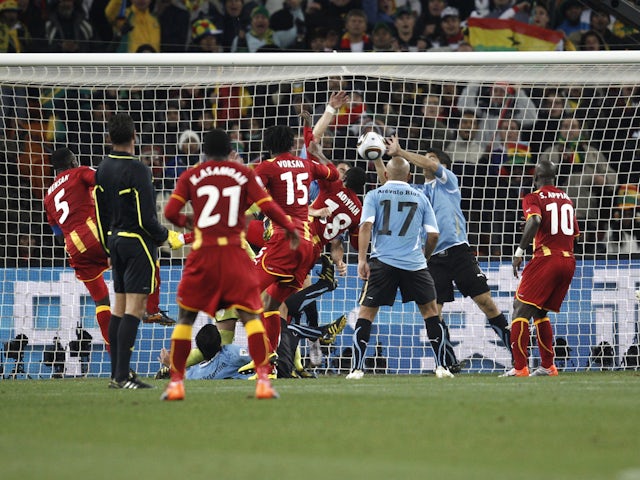 © Reuters
© Reuters
The first-ever African World Cup in 2010 would have been the dream location for a nation from the continent to finally become the first to reach a semi-final, or go even further, and Ghana looked set to do just that when they faced Uruguay in Johannesburg.
With penalties looming, a goalmouth scramble ensued from a Ghanaian corner where Luis Suarez had already blocked Stephen Appiah's strike on the line, before denying Dominic Adiyiah's header blatantly with his hands.
Olegario Benquerenca wasted no time pointing to the spot and sending Suarez off, but with 122 minutes on the clock and a semi-final place on the line, Asamoah Gyan hit the crossbar with his penalty, sparking jubilant celebrations from Suarez halfway down the tunnel.
The misery compiler was to follow, as Ghana lost the shootout after missing two of their first five, giving Sebastian Abreu the chance to dink his penalty home to send Uruguay through instead.
Suarez was labelled a cheat and a disgrace by his Ghanaian opponents and manager, but considering that a penalty and a red card was given, it is hard to disagree that justice was served, and Ghana just did not take their opportunity, but either way, it remains one of the most memorable and controversial moments from that World Cup.
4. Argentina vs. Peru, 1978
The format used in the 1978 World Cup meant that this second group-phase fixture virtually became a semi-final for Argentina, helped also in part by the fact that final group games were not played simultaneously by this point.
After Brazil beat Poland 3-1 in the other game in the group, Argentina knew what they needed to do to qualify for the final when they faced Peru in their own final fixture the following day - win by four clear goals to leapfrog Brazil on goal difference.
The dictatorship in Argentina was desperate for La Albiceleste to lift the trophy on home soil to help improve their image around the world, and therefore endless conspiracy theories were drawn up after Argentina hammered Peru 6-0 to book their place in the final, mainly, of course, from the Brazilian press.
Theories ranging from alleging the Peruvian goalkeeper was born in Argentina to threats being made towards the Peruvian players were all bandied about, and it was not until decades later where some of those in the Peru side and within the Peruvian government at the time confirmed that a deal had been made and the players were pressured to underperform.
It is believed that a political agreement was made between the two nations in favour of Peru, so in return they would agree to 'throw' the game so Argentina could reach the final, a final they would go on to win against the Netherlands.
3. South Korea's run to the semi-finals, 2002
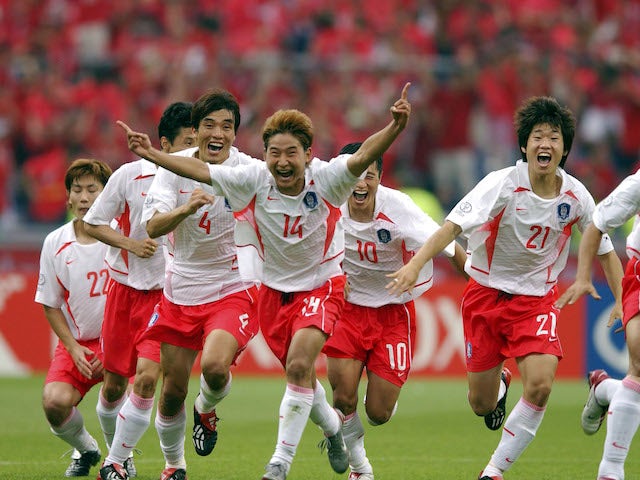 © Reuters
© Reuters
Officials being accused of aiding a home nation to World Cup glory is nothing new, as Italy in 1934, England in 1966 and Argentina in 1978 are three famous examples where teams have been accused of receiving favourable decisions which helped them on their way to home successes.
When the World Cup came to Asia for the first time in 2002, these conspiracies came out of the woodwork again, with some holding the belief that co-hosts South Korea in particular were given multiple dodgy decisions in their favour to ensure their progression through the tournament to drum up more interest among the home population.
Their knockout matches against Italy and Spain have come under intense scrutiny ever since - so much so that then-FIFA president Sepp Blatter had to come out and admit that some of the officiating at the finals had been a disaster.
Ecuadorian referee Byron Moreno disallowed a perfectly legitimate goal and sent off Francesco Totti for a non-existent dive in Italy's last-16 encounter with the Koreans, while Spain were denied two legitimate goals of their own in the quarter-final, with the linesmen accused of flagging Spanish attackers offside without second thought, no matter how tight it looked.
With South Korea's run to the semi-final deemed farcical, they had done little to win over neutrals when the plucky underdogs faced Germany, where they were finally eliminated and also lost in the third-place playoff to Turkey just days later.
2. Zidane's headbutt, 2006
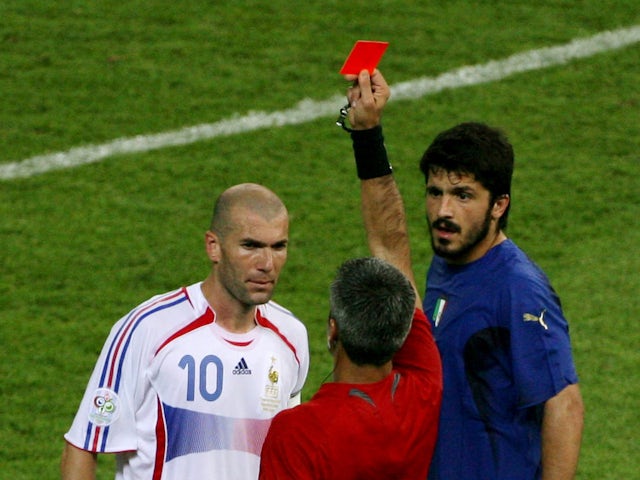 © Reuters
© Reuters
The eyes of the footballing world were on Zinedine Zidane at the 2006 World Cup, as the French talisman revealed he would be retiring from football altogether following the tournament.
He had been heavily involved in their run to the final, scoring the clinching goal against Spain, setting up the winner versus Brazil, then converting a penalty to beat Portugal in the semi-final.
Italy were the final obstacle trying to stop Zidane from a fairytale finish to his career, but a sixth-minute panenka penalty from Zizou put Les Bleus ahead.
Marco Materazzi would level soon after and the match went the distance, and just before the game would go to penalties, the two goalscorers were involved in one of the most infamous moments in World Cup history.
An off-the-ball incident left Materazzi sprawled on the floor and Gianluigi Buffon incensed before Horacio Elizondo brandished a red card in the direction of Zidane, as TV cameras would then reveal Zidane headbutting the Italian defender in the chest.
Again, numerous conspiracies were drawn up about what possessed Zidane to attack Materazzi, so much so that the ex-Everton defender was forced to sue three British newspapers who alleged he made racist comments to his opponent.
Materazzi later admitted he made remarks about Zidane's sister after some back and forths following a tussle in the penalty area, but Zidane ended his career in disgrace following his outburst, and France would go on to lose the penalty shootout too.
1. The Hand of God, 1986
Diego Maradona and controversy go hand-in-hand.
The little Argentine genius was never one to cower away from mischief, making headlines on numerous occasions, both at club and international level, and no football match could perfectly encapsulate what Maradona was all about more than the 1986 World Cup quarter-final against England.
In the match where he scored the 'Goal of the Century' dribbling past nearly the entire England side plus goalkeeper Peter Shilton before knocking the ball into the vacant net, he scored an equally famous goal for the opposite reasons just four minutes earlier, the 'Hand of God'.
With Maradona standing in an offside position, he was unknowingly played through on goal by a wild looping kick towards his own goal by Steve Hodge, and with the knowledge that he was not going to beat Shilton in the air, as he was almost a foot smaller, he raised his fist to punch the ball beyond the England keeper into the net, before wheeling away in celebration, avoiding any sheepish actions that would look suspicious.
Quite incredibly, both the referee and linesman missed the handball and the goal stood, with Argentina taking a 1-0 lead as a result and going on to win the tie and the tournament.
It is a goal which still provokes fury amongst English fans and either taints or enhances Maradona's reputation depending on your viewpoint, but it remains the most controversial, and arguably iconic, moment in World Cup history.








